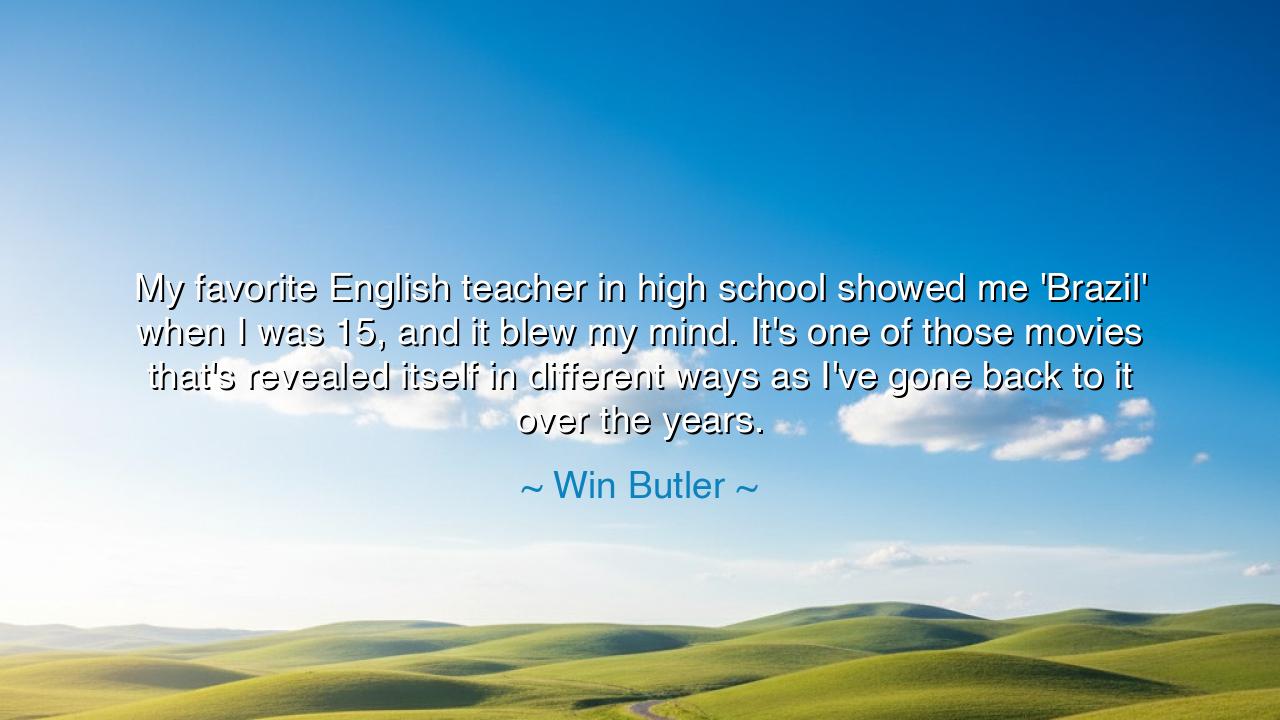
My favorite English teacher in high school showed me 'Brazil'
My favorite English teacher in high school showed me 'Brazil' when I was 15, and it blew my mind. It's one of those movies that's revealed itself in different ways as I've gone back to it over the years.






The musician Win Butler, frontman of Arcade Fire, once recalled a moment of awakening: “My favorite English teacher in high school showed me Brazil when I was 15, and it blew my mind. It's one of those movies that's revealed itself in different ways as I've gone back to it over the years.” In this confession lies a timeless truth: that a teacher, by a single act of guidance, may open the door to wonder, and that art, once received into the heart, may grow and reveal new depths across a lifetime.
The teacher in this story is no mere instructor of grammar and essays, but a guide into the realm of imagination. By showing the young Butler the film Brazil, he planted within him not just entertainment, but a seed of reflection. For Brazil, with its dystopian satire and surreal beauty, is a work that unsettles as much as it inspires. To encounter it at the age of fifteen, when the soul is still tender and searching, is to be confronted with questions of freedom, conformity, and the meaning of life itself. Thus, this teacher became a gatekeeper to deeper vision, an awakener of the spirit.
Butler describes the film as having revealed itself in different ways as he returned to it through the years. Here lies the power of great art: it is not static, but alive. To the youth, it may seem shocking, a rebellion against authority. To the adult, it may appear tragic, a mirror of society’s entanglements. To the elder, it may become philosophical, a meditation on hope amid despair. Just as a river reflects the sky differently at dawn, noon, and dusk, so does a masterpiece reflect new truths as the soul passes through its seasons.
History provides similar tales. Consider St. Augustine, who as a young man read Cicero’s Hortensius. At first it stirred only ambition, but as he revisited the wisdom of classical thought, it became a stepping stone toward faith and philosophy. Or recall the poet T. S. Eliot, who returned again and again to Dante’s Divine Comedy, each time discovering fresh meaning as his own life moved from disillusionment to conversion. So too Butler finds that Brazil is not a single experience, but a companion on the road of life, speaking differently as he himself changes.
The lesson is clear: do not dismiss the power of art and teachers in shaping destiny. A book, a film, a song introduced at the right time may alter the course of a life. And do not imagine that the meaning of such works is exhausted at first glance. Return to them, again and again, for their treasures unfold slowly, like stars emerging one by one in the night sky. What was once strange may become profound; what was once confusing may become revelation.
Practically, this means we must honor our teachers, who hold the keys to such awakenings. Parents, mentors, friends—all may introduce us to the works that will shape our souls. And we ourselves must take up this role, guiding others to art, story, and wisdom that may change their lives. At the same time, let us cultivate patience: do not discard a book or a film after one encounter. Let it rest, let it age, and return to it as you yourself grow.
Thus Butler’s words shine as both gratitude and wisdom. An English teacher gave him Brazil, and in that gift he found not only a film, but a lifelong dialogue. For true art, once given, is never finished—it grows with us, and we grow with it. And the task of every soul is to keep returning, keep seeking, keep discovering, until what once “blew our minds” at fifteen becomes the wisdom that guides us in the twilight of our days.






AAdministratorAdministrator
Welcome, honored guests. Please leave a comment, we will respond soon